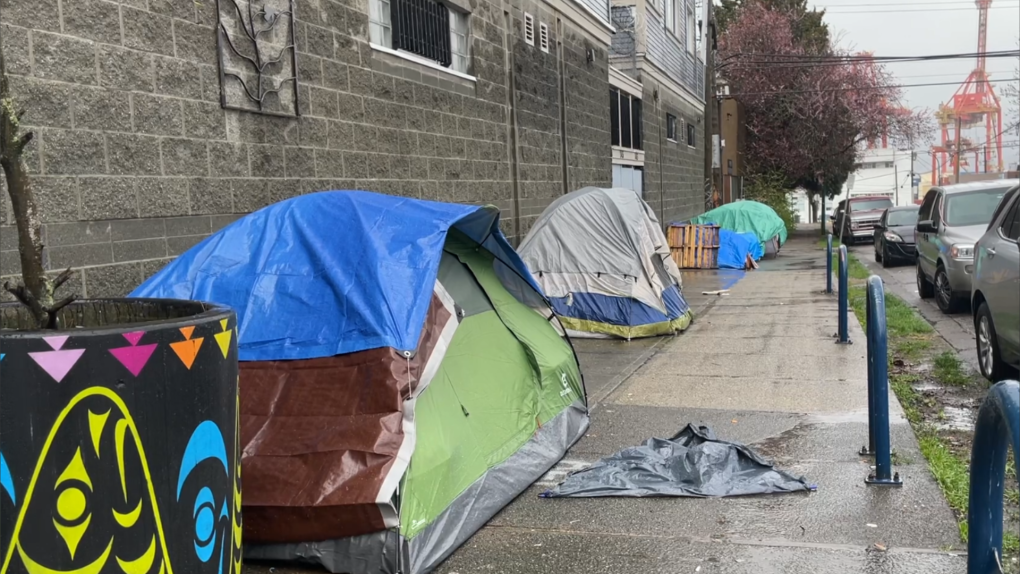Despite vocal opposition, city says Hastings decampment showing positive results
 After City of Vancouver crews and police cleared an encampment on East Hastings Street, tents were set up on side streets and in other parts of the city.
After City of Vancouver crews and police cleared an encampment on East Hastings Street, tents were set up on side streets and in other parts of the city.
The City of Vancouver says crime, overdose calls and fire calls are declining in the Downtown Eastside.
After a large operation to remove tents, structures, propane tanks and garbage from Hastings Street earlier this month, the city claims Vancouver Fire and Rescue Services (VFRS) saw a 30 per cent decline in fires in the Downtown Eastside since April 5.
Vancouver Police says it has recorded no stabbings or serious assaults in the encampment area since last Wednesday.
VFRS also claims it received 27 fewer overdose related calls the week of April 3-9 than the previous week.
One DTES advocate tells CTV News the stats are misleading.
"I think that's a preposterious manipulation of statistics," said Hamish Ballantyne, community organizer with the Vancouver Area Network of Drug Users (VANDU). "If there's an outdoor fire, it's happening in an alley or a park outside the DTES where someone's been forced to take shelter and no one's out there to look out for them or call the fire department when their tent burns down."
Ballantyne says many of those who lived on Hastings Street are devastated with the encampment evictions.
"I've been tracking them down in alleys, some people are setting up tents behind dumpsters, many people had their tents thrown away."
The city claims there are temporary beds available for those living in the DTES who want them, but Ballantyne disagrees with that statement.
"Shelter capacity is effectively zero," said Ballantyne.
The city, via news release, claims shelters are a dignified and safer option compared to encampments.
CTV News spoke to a man living in a single room occupancy building (SRO) who strongly disagrees.
"I personally would rather sleep on the street again than live in my house," said Aero Marion. "Pests, infestations, like, I have rats, I have mice, I have cockroaches."
Marion says he's grateful for having a bed and does feel safer in the SRO, but understands why many people choose to stay on the streets.
Despite criticism of the encampment removal, the city has no plans on changing its policy.
CTVNews.ca Top Stories

Ontario pitches energy partnership with U.S. amid Trump's tariff, Canada annexation threat
In the face of incoming U.S. president Donald Trump’s threat to acquire Canada and impose tariffs, Ontario Premier Doug Ford says he wants to expand its energy supply both sides of the border.
Mexico's President Sheinbaum offers sarcastic response to Trump's 'Gulf of America' comment
Mexico's President Claudia Sheinbaum responded sarcastically on Wednesday to U.S. president-elect Donald Trump's proposal to change the name of the Gulf of Mexico to the Gulf of America.
JetBlue passenger suddenly opens exit door as flight is taxiing for takeoff at Boston airport
A person on board a plane at Boston Logan International Airport that was taxiing for takeoff suddenly opened an exit door and was quickly restrained by other passengers, authorities said.
Canada among 'top 5 losers' in new passport ranking
A new global ranking may raise doubts about Canada's reputation of being open to other countries.
LIVE UPDATES Tracking the L.A. wildfires: 2 dead as major fires at 0% containment, locals describe 'terrifying' escape
A series of wildfires are searing through the Los Angeles area, forcing many to evacuate their homes. Follow along here for the latest updates.
WATCH 'Like driving through hell itself': Apocalyptic scene on L.A. highway
Terrifying video shows a California resident’s drive along the Pacific Coast Highway in Los Angeles, as the Palisades wildfire engulfs buildings and homes.
Expected guilty plea for man in 'Wizard of Oz' ruby slippers case postponed due to hospitalization
A hearing where a Minnesota man was expected to plead guilty to hiding a stolen pair of ruby slippers that Judy Garland wore in 'The Wizard of Oz' was postponed indefinitely Wednesday after his attorney told the court that the man is hospitalized.
Mexico offers protection to famed singer after drug cartel death threats
Authorities in Mexico are offering state protection to famed regional Mexican singer Natanael Cano and other artists after a drug cartel in northern Mexico publicly threatened them, prosecutors confirmed to The Associated Press.
Minister LeBlanc not running for Liberal leadership, as caucus meets for first time since Trudeau resignation
Longtime cabinet minister Dominic LeBlanc will not be running to replace Prime Minister Justin Trudeau as head of the Liberals. He announced his decision in a statement posted to social media on Wednesday.
































